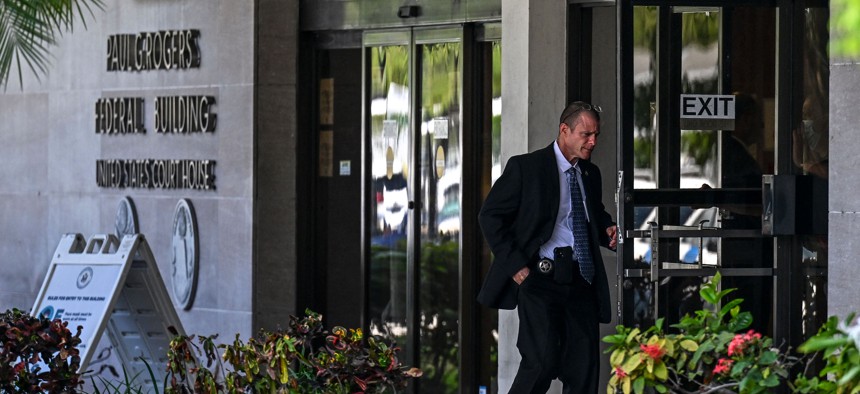House Oversight Dems Seeking Data From Social Media Companies About Threats to Law Enforcement

Security officers guard the entrance to the Paul G. Rogers Federal Building & Courthouse as the court holds a hearing to determine if the affidavit used by the FBI as justification for last week's search of Trump's Mar-a-Lago estate should be unsealed, at the US District Courthouse for the Southern District of Florida in West Palm Beach, Florida on August 18, 2022. - FBI agents recovered multiple highly classified records during the search of former US President's estate, according to documents made public during a probe that includes possible violations of the US Espionage Act. CHANDAN KHANNA/AFP via Getty Images
Lawmakers are demanding information from online platforms about how they are responding to growing threats against law enforcement officials following the FBI’s search of Mar-a-Lago.
Democratic leaders on the House Oversight and Reform Committee sent letters to executives at eight social media companies on Friday asking them to turn over information about threats made against law enforcement officers on their platforms in the wake of the Federal Bureau of Investigation’s search of former President Donald Trump’s Mar-a-Lago home earlier this month.
The letters asked Gab, Gettr, Meta, Rumble, Telegram, TikTok, Truth Social and Twitter to respond to the committee by September 2 with information about their policies and efforts to combat threats against law enforcement on their platforms.
“The committee is seeking to understand how your company responds when users post threats against law enforcement, how your company plans to prevent your platforms from being used to incite violence against law enforcement personnel, and whether legislative reform is necessary to protect law enforcement personnel and increase coordination with federal authorities,” Committee Chairwoman Carolyn Maloney, D-N.Y., and National Security Subcommittee Chairman Stephen Lynch, D-Mass., wrote.
The letters referenced incendiary statements from Republican lawmakers and a “spike in social media users calling for civil war” after the FBI executed a search warrant at Trump’s Florida residence on August 8 as part of an ongoing investigation into the handling of classified documents by the former president. The FBI and the Department of Homeland Security also issued a joint intelligence bulletin warning of a sharp increase in online threats against law enforcement officials and facilities.
Only three days after the FBI search, a man fired a nail gun into the FBI Cincinnati field office and was later killed after an armed standoff with police officers. The man posted about his desire to attack FBI agents on Truth Social—Trump’s social media platform—following the FBI’s search of Mar-a-Lago. A Pennsylvania man was also arrested for making violent threats against FBI personnel on the right-wing social media platform Gab.
“The committee strongly supports the First Amendment rights of all Americans to speak out about the actions of their government and law enforcement matters, including on social media platforms,” the chairs wrote. “However, threats and incitements of deadly violence are unacceptable and against the law.”
In a blog post, Gab founder and CEO Andrew Torba said the social media platform was considering its response to the committee and added that “we cooperate with law enforcement regularly on public safety matters and we never comment on non-public communications with law enforcement.”






